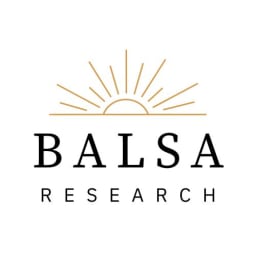
Fund Balsa Research Initiatives in 2025
- Raised
- $53,020
- Goal
- $120,000
What We Did in 2024
Our work this year focused on building a robust foundation for future policy change:
In March, we opened up an RFP for academic studies to deliver up-to-date rigorous quantifications of the economic costs of the Jones Act. We’ve since accepted proposals from two teams of academics that we are excited to work with from top econ programs in the US. The contracts have been signed, the data sets required for the work are getting paid for, and the academics are now in the process of starting work on their analyses.
The two proposals take complementary approaches:
- A Macro-level Trade Impact Model: This proposal aims to construct a large-scale detailed gravity model of domestic and international trade flows across the complex network of routes, evaluating the Jones Act's comprehensive impact on US trade patterns. This will create a "gains from trade" view of the Act and its potential repeal. By comparing the current constrained system with a hypothetical unconstrained one within this model, the study will estimate the hidden costs and inefficiencies introduced by the Jones Act.
- A Micro-level Agricultural Commodity Analysis: This proposal focuses on the impact of the Jones Act on U.S. inter-state agricultural trade, with a particular emphasis on California-produced goods, aiming to pinpoint the exact impact of the Jones Act on their transportation and pricing. Similar to the methodology used in a recent paper on the Jones Act’s impact on US petroleum markets, this granular analysis will provide concrete, quantifiable evidence of the Act's effects on specific goods. By focusing on a specific sector and concrete details, this research could offer valuable hard data to support broader reform efforts and be extended by further research.
Both of these approaches have the potential to significantly advance our understanding of the Jones Act's economic impact – one at a state level, and one at a national one. By funding both studies, we’re looking to create a stronger case for Jones Act reform.
We consider the RFP to still be open! If we get more exciting proposals, we will continue to be excited.
We have also published The Jones Act Post. This was the result of months of research, interviews with experts in the policy sphere and various stakeholders, plus Zvi’s usual curation process. This is our definitive case for Jones Act repeal.
We’re also working to develop relationships with key players and experts to better understand both the technical challenges and political dynamics around potential reform.
It would be reasonable to say this is slow progress. We've prioritized getting things right over moving quickly, and have a modest budget. Policy change requires careful groundwork - especially on an issue where entrenched interests have successfully resisted reform for a century.
Looking Ahead to 2025
With this foundation in place, we’re positioned to accelerate our work in 2025. We’re looking to do the following:
- Launch a second round of funding for targeted academic research, focusing on specific costs and impacts of the Jones Act, informed by the preliminary findings of studies funded in our first round.
- Conduct an analysis of key players' interests and constraints to identify viable reform paths.
- Building on all of our existing research, develop detailed and viable policy proposals that address key stakeholder concerns, including:
- Protecting union jobs and worker interests
- Maintaining military readiness and security capabilities
- Structuring viable transition paths and compensation mechanisms
- Draft model legislation that can serve as a foundation for reform.
From the very beginning, our philosophy has been to focus on the useful groundwork that enables real policy change, and this is where our focus remains. Additional funding would allow us to expand our impact and accelerate our work.
Why Support Balsa
To be clear: we have funding for our core 2025 expenses and the initiatives outlined above. Additional support would allow us to expand our impact through better assisting activities such as:
- Industry and labor outreach ($5,000+)Fund attendance at three key maritime industry and union conferences to build relationships with people working in shipping, unions, and policy. This would cover registration fees, travel, and accommodations.
- Additional Research & Analysis (~$30,000 per study)Fund additional academic studies to strengthen the empirical case for reform, complementing our existing research initiatives, as we discover new opportunities.
- Policy Engagement ($85,000)Hire a DC-based policy liaison to build ongoing relationships with key policymakers. This would help us better understand their needs and priorities, allowing us to create more targeted and timely policy documents that directly address their concerns.
- Additional Causes (unlimited)We see opportunity in many other policy areas as well, including NEPA reform and federal pro-housing policy. With additional funding we could address those sooner.
While changing century-old policy is never easy, we see a real path to progress through careful, methodical work to build both the case for and the solutions needed for reform.
We invite you to join us in this effort.
Balsa Research is a small organization - still just one full-time worker - and our progress this year has been possible only through the generous support of our donors and the many people who have shared their time and expertise with us. We're grateful for this community of supporters and collaborators who continue to believe in the importance of this work.
